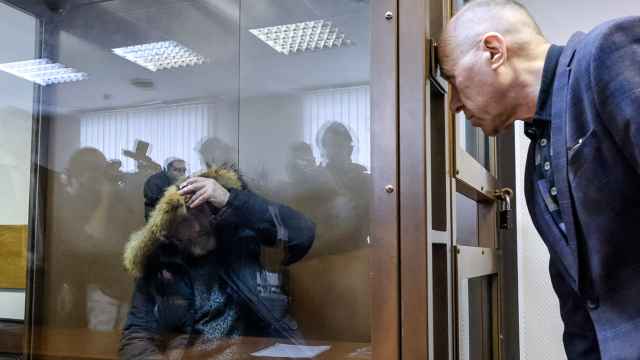President Vladimir Putin said a fifth generation jet fighter would be introduced to the air force by 2016 and that a “balanced” decision should be made, regarding the use of foreign pilots in domestic civil aviation, during his marathon call-in show on Thursday.
Putin has said defense spending is a priority for his third term as president.
“The plane is currently in the works and is undergoing tests,” Putin said. He added that the new Sukhoi T-50 plane would be more sophisticated than the American-made F-35 jet fighter produced by Lockheed Martin.
“But there are issues which still need to be worked out, like the engine and weapons,” he said, referring to the T-50.
Referring to the new plane, Putin was answering a question from a test pilot at the air force training center in Lipetsk.
Standing nearby was major general Alexander Kharchevsky, the center’s long serving former commander.
Despite opposition from trade unions, Putin said foreigners would be allowed to become civilian pilots, citing a lack of specialists.
Putin warmly greeted Kharchevsky, who piloted a fighter jet with the president as his passenger to Chechnya in 2000. “I remember how you trained me to do a bochka,” Putin said, referring to the Russian jargon for a maneuver when the pilot rotates the jet. The move is called a barrel roll in U.S. aviation lexicon.
The Lipetsk center suffered a scandal in 2011 when one of its pilots, Igor Sulim, made a statement that senior officers demanded money from him and other officers to rise in the ranks.
Several of the center’s officers, among them Kharchevsky’s subordinates, were fired after the scandal. Kharchevsky, who headed the center during that time, became the head of the Air Force Academy in Voronezh and is currently head of the “Eagles of Russia” stunt pilots group.
Putin also said on Thursday that Russia would allow foreigners to be civilian pilots, although the move is opposed by trade union members, citing the lack of pilots as the reason.
He said that while the country’s six schools prepared 940 pilots this year, there was a need to prepare 1,200 pilots monthly.
But he said the decision regarding pilots should represent a “balance” between air safety and national security needs.
He added that the government was considering allowing up to 200 foreign pilots per year, answering a question from Magomed Tolboyev, a renowned test pilot and strong opponent of the idea.
Putin said foreign pilots would be trained to fly foreign made planes, among them wide-body aircraft, which the country “doesn’t produce now.”
According to recent Industry and Trade Ministry figures, the country’s share in the domestic civil aircraft market is 1.1 percent.
Russia is three years behind on mass production of several planes, including the Superjet 100, Tu-204 and Be-200 seaplane.
Industry experts say corruption and a lack of public oversight are the biggest problems of the country’s defense sector, which is expected to get 20 trillion rubles of government money by 2020 to replace up to 70 percent of the nation’s military hardware. Another commonly cited problem is the absence of quality personnel.
The country’s military scientists are working on designs of a new train-based ballistic missile system, according to Deputy Defense Minister Yuri Borisov, Vedomosti reported Thursday, citing Borisov.
He said that although that research was still on “paper,” a decision would be made to go through with the project.
In the late Soviet era, the defense industry developed a similar system based at the Yuzhnoye Design Bureau in the Ukrainian Soviet Socialist Republic.
The system, called Molodets or “good guy” in Russian, was labeled the SS-24 by NATO. Such systems were forbidden by the START II treaty, but Russia exited the agreement in 2002.
Contact the author at [email protected]
Related articles:
A Message from The Moscow Times:
Dear readers,
We are facing unprecedented challenges. Russia's Prosecutor General's Office has designated The Moscow Times as an "undesirable" organization, criminalizing our work and putting our staff at risk of prosecution. This follows our earlier unjust labeling as a "foreign agent."
These actions are direct attempts to silence independent journalism in Russia. The authorities claim our work "discredits the decisions of the Russian leadership." We see things differently: we strive to provide accurate, unbiased reporting on Russia.
We, the journalists of The Moscow Times, refuse to be silenced. But to continue our work, we need your help.
Your support, no matter how small, makes a world of difference. If you can, please support us monthly starting from just $2. It's quick to set up, and every contribution makes a significant impact.
By supporting The Moscow Times, you're defending open, independent journalism in the face of repression. Thank you for standing with us.
Remind me later.





